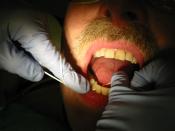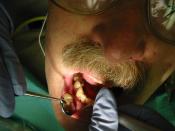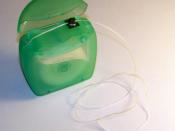Medical and Dental Considerations When Dental Hygienists are Treating Hemophiliac Clients Medical and Dental Considerations When Dental Hygienists are Treating Hemophiliac Clients There are oral health issues that can arise when dental hygienists treat clients with hemophilia. People with hemophilia are missing some important proteins that help the blood to clot (Carson-DeWitt 1). Dental hygienists can provide hemophiliac clients better care by: teaching them proper oral care, consulting with their doctors before treatment, and advising them to have a scaling and check-up every 6 months.
Dental hygienists can help hemophiliacs maintain their teeth by teaching them proper brushing and flossing techniques. The client should brush twice a day with a soft toothbrush and floss gently to prevent plaque build-up, decay, and gum disease. Some hemophiliacs are afraid to brush and floss because they don't want their gums to start bleeding. Bleeding is a difficult problem for hemophiliacs because they bleed longer.
Spontaneously bleeding gums is usually the first sign of dental disease or gingivitis (Darby and Walsh 366). Treating it with factor concentrate or other therapies may temporarily stop the bleeding, but not the disease. Daily brushing and flossing will toughen gums and prevent gum disease, which will decrease bleeding. These preventative measures will decrease the need for dental surgery resulting from decay. Dental health affects overall health, making it even more important for people with hemophilia to have good dental habits.
Dental hygienists need to be aware that hemophiliacs may have complications with healing or infections after dental scaling. Their medical doctor should be consulted before treatment. (Darby and Walsh 273) Hemophiliacs may need clotting factor replacement therapy to increase the amount of clotting factor in the blood before treatment (Carson-DeWitt 3).
Hemophiliac clients should be advised the importance of regular visits every 6 months to for a dental scaling and check-up. Regular check-ups allow the dentist to diagnose disease and treat problems. This allows the patient to deal with small problems rather than large ones that like root canal therapy, extractions, or surgery. These procedures may produce complications like prolonged bleeding or internal bleeding, which create bruises (Carson-DeWitt 2).
With hemophiliac patients, there are certain things hygienists should be aware of like: the patient's personal oral care habits, the concerns their family doctor may have before treatment, and the importance of recall visits for dental maintenance.
Bibliography Carson-DeWitt, Rosalyn S. "Hemophilia." Gale Encyclopedia of Medicine. 01 January 1995. Darby, Michele L., and Margaret M. Walsh. Dental Hygiene Theory and Practice. Philadelphia: W.B. Saunders Company, 1995.





